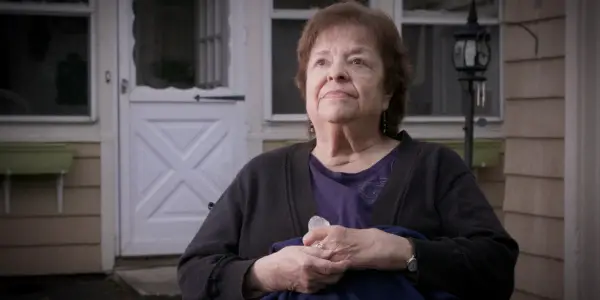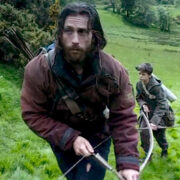Tribeca Film Festival 2024: THEY’RE HERE

Stephanie Archer is 39 year old film fanatic living in…
One of the things loved about the Tribeca Film Festival is the diversity in programming within its documentary selections, delivering to audiences a wealth of information, experience and emotion. And this year, there was no exception for how far its documentaries would reach. Yet, as much as I was intrigued by the potential of Daniel Claridge and Pacho Velez‘s They’re Here, I found this out of this world documentary left much to be desired.
“It’s not your time to believe”
Opening with a bright white light, They’re Here is almost blinding in nature. As the camera holds firm, you can almost feel the warmth of the light and a sense of being drawn in. As the documentary transitions into an arial view from above, this visceral feeling continues to flow through the audience, the camera eventually working to bring us to one of the houses below.
It is here we are introduced to Cookie who delivers her first person account of her various abductions over the years – 14 to be exact. As she speaks to the various otherworldly visitors that have taken her from her home, even recanting a tour she was given of their ship, we are quickly given the breadth of her experiences, ones that have occurred 2-3 times a year, especially in those years of unrest.

There is a deep awareness that feels present in Cookie, making her the perfect launching pad for the film’s numerous first-hand testimonials of alien experiences. Cookie seems at peace with her truth, accepting that her truth may not and does not need to be the truth of others – “It’s not your time to believe”. As They’re Here transitions from Cookie’s story to rest of the film, it captures the wonderment in the eyes of others, heightening not only the fantastic elements of Cookie’s experiences, but laying the groundwork for what draws us into hearing their stories – what has drawn us in to view this documentary today.
Yet, as strong as this opening is, it loses some of its grip on its audience – the stories many times feeling too unbelievable. The filmmakers are clever to have Cookie’s testimonial introduced first, her words that “it’s not your time to believe” hanging over each of those moments audience members may find wildly unbelievable. Too often, the most simplest explanation far outweighs the belief of the subject on screen, leeching some of the credibility the filmmakers want the audience to understand.
Human Experience and Connection
When reading the synopsis for the film of multiple alien encounters in my neighboring state of Rochester, New York, I was instantly and irresistibly intrigued. Yet, I found as the film continued, it lost its initial luster. Delivering a platform for these voices and stories to be heard, the unbelievable matched with the impossible weighs heavy. The filmmakers do not help their case of authenticity and credibility as they interweave various special effects and setups that take away from their subjects, making their stories even more fantastical. So much so, that at times it feels as though the filmmakers are making fun of the subjects they are filming.

Yet, it is in these moments They’re Here is able to document something more worldly than it might have intended – the acceptance of the human experience. There is a relatability deeply ingrained in the discouragement of each of these stories. When others don’t believe, how long can you? There is a moment of knowing ones own self and accepting one’s own truth that will resonate with audiences who are willing to look beyond the fantastical. In moments of self doubt, They’re Here captures a purity within the human experience.
However, it is not only in the human experience of self-doubt in the eyes of others that They’re Here captures. Rather the perseverance and translation of self. For many of the film’s subjects, they have turned their experiences – real or perceived – into art and connection. Utilizing comedy, music, entertainment, festival,s and community groups, They’re Here becomes a a further examination of the human connection and our need to find others like ourselves. In these moments of self-doubt, it is communities and various forms of expression where we can truly be ourselves.
Conclusion
Overall, They’re Here will struggle to connect to its audience, too often feeling as though it is attempting to only reach others whose experiences matches its own.
Does content like this matter to you?
Become a Member and support film journalism. Unlock access to all of Film Inquiry`s great articles. Join a community of like-minded readers who are passionate about cinema - get access to our private members Network, give back to independent filmmakers, and more.












